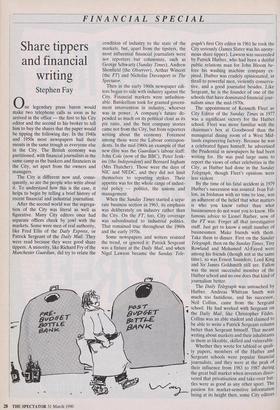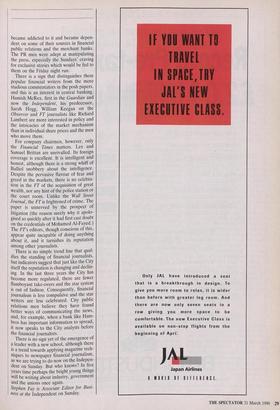FINANCIAL SPECIAL
Share tippers and financial writing
Stephen Fay
One legendary press baron would make two telephone calls as soon as he arrived in the office — the first to his City editor and the second to his broker to tell him to buy the shares that the paper would be tipping the following day. In the 1940s and 1950s most newspapers had their snouts in the same trough as everyone else in the City. The British economy was partitioned, with financial journalists in the same camp as the bankers and financiers in the City, set apart from the owners and managers.
The City is different now and, conse- quently, so are the people who write about it. To understand how this is the case, it helps to begin by telling a brief history of recent financial and industrial journalism.
After the second world war the segrega- tion of the City was literal as well as figurative. Many City editors once had separate offices cheek by jowl with the markets. Some were men of real authority, like Fred Ellis of the Daily Express, or Patrick Sergeant of the Daily Mail. They were read because they were good share tippers. A minority, like Richard Fry of the Manchester Guardian, did try to relate the condition of industry to the state of the markets, but, apart from the tipsters, the most influential financial journalists were not reporters but columnists, such as George Schwartz (Sunday Times), Andrew Shonfield (the Observer), Arthur Wincott (the FT) and Nicholas Davenport in The Spectator.
Then in the early 1960s newspaper edi- tors began to side with industry against the City. Financial markets were unfashion- able. Butskellism took for granted govern- ment intervention in industry, whoever was in power. A company's future de- pended as much on its political clout as its p/e ratio, and the best company stories came not from the City, but from reporters writing about the economy. Foremost among those were the Labour correspon- dents. In the mid-1960s an example of that new elite was the Guardian's labour staff: John Cole (now of the BBC), Peter Jenk- ins (the Independent) and Bernard Ingham (Mrs Thatcher). Those were the days of NIC and NEDC, and they did not limit themselves to reporting strikes. Their appetite was for the whole range of indust- rial policy — politics, the unions and management.
When the Sunday Times started a sepa- rate business section in 1963, its emphasis was deliberately on industry rather than the City. On the FT, too, City coverage was subordinated to industrial politics. That remained true throughout the 1960s and the early 1970s.
Some newspapers and writers resisted the trend, or ignored it: Patrick Sergeant was a fixture at the Daily Mail, and when Nigel Lawson became the Sunday Tele- graph's first City editor in 1961 he took the City seriously (James Slater was his anony- mous share tipper). Lawson was succeeded by Patrick Hutber, who had been a dutiful public relations man for John Bloom be- fore his washing machine company ex- pired. Hutber was crudely opinionated, in thrall to powerful men, violently conserva- tive, and a good journalist besides. Like Sergeant, he is the founder of one of the schools that have dominated financial jour- nalism since the mid-1970s.
The appointment of Kenneth Fleet as City Editor of the Sunday Times in 1977 was a significant victory for the Hutber school. Fleet was more familiar with the chairman's box at Goodwood than the managerial dining room of a West Mid- lands engineering factory. Because he was a celebrated figure himself, he advertised the Prudential in newspapers he had been writing for. He was paid large sums to report the views of other celebrities in the City, as Hutber had done in the Sunday Telegraph, though Fleet's opinions were less violent.
By the time of his fatal accident in 1979 Hutber's succession was assured. Ivan Fal- lon, an Irishman with no time to lose, was an adherent of the belief that what matters is who you know rather than what businessmen do not want you to know. His famous advice to Lionel Barber, now of the FT was: Forget all that investigative stuff. Just get to know a small number of businessmen. Make friends with them. Take them to dinner. First on the Sunday Telegraph, then on the Sunday Times, Tiny Rowland and Mohamed Al-Fayed were among his friends (though not at the same time), so was Ernest Saunders; Lord King and Sir James Goldsmith still are. Fallon was the most successful member of the Hutber school and no one does that kind of journalism better.
The Daily Telegraph was untouched by Hutber. Andreas Whittam Smith was much too fastidious, and his successor, Neil Collins, came from the Sergeant school. He had worked with Sergeant on the Daily Mail, like Christopher Fildes. Collins was an able student and claimed to be able to write a Patrick Sergeant column better than Sergeant himself. That meant writing about markets and their inhabitants in them as likeable, skilled and vulnerable.
Whether they wrote for tabloid or quali- ty papers, members of the Hutber and Sergeant schools were popular financial journalists, and they were at the peak of their influence from 1983 to 1987 during the great bull market when investors disco- vered that privatisation and take-over bat- tles were as good as any other sport. The passion for market-sensitive information being at its height then, some City editors
became addicted to it and became depen- dent on some of their sources in financial public relations and the merchant banks.
The PR men were adept at manipulating the press, especially the Sundays' craving for exclusive stories which would be fed to them on the Friday night run.
There is a sign that distinguishes these popular financial writers from the more studious commentators in the posh papers, and this is an interest in central banking. Hamish McRea, first in the Guardian and now the Independent, his predecessor, Sarah Hogg, William Keegan on the Observer and FT journalists like Richard Lambert are more interested in policy and the intricacies of the market mechanism than in individual share prices and the men who move them.
For company chairmen, however, only the Financial Times matters. Lex and Samuel Brittan are unrivalled. Its foreign coverage is excellent. It is intelligent and honest, although there is a strong whiff of Balliol snobbery about the intelligence. Despite the pervasive flavour of fear and greed in the markets, there is no celebra- tion in the FT of the acquisition of great wealth, nor any hint of the police station or the court room. Unlike the Wall Street Journal, the FT is frightened of crime. The paper is unnerved by the prospect of litigation (the reason surely why it apolo- gised so quickly after it had first cast doubt on the credentials of Mohamed Al-Fayed.) The FT's editors, though conscious of this, appear quite incapable of doing anything about it, and it tarnishes its reputation among other journalists. There is no simple trend line that qual- ifies the standing of financial journalists, but indicators suggest that just like the City Itself the reputation is changing and declin- ing. In the last three years the City has become more regulated, there are fewer flamboyant take-overs and the star system is out of fashion. Consequently, financial journalism is less compulsive and the star writers are less celebrated. City public relations men believe they have found better ways of communicating the news, and, for example, when a bank like Ham- bros has important information to spread, It now speaks to the City analysts before the financial journalists. There is no sign yet of the emergence of a leader with a new school, although there is a trend towards applying magazine tech- niques to newspaper financial journalism, as we are trying to do now on the Indepen- dent on Sunday. But who knows? In five years time perhaps the bright young things will be writing about industry, government and the unions once again. Stephen Fay is Associate Editor for Busi- ness at the Independent on Sunday.



























































 Previous page
Previous page